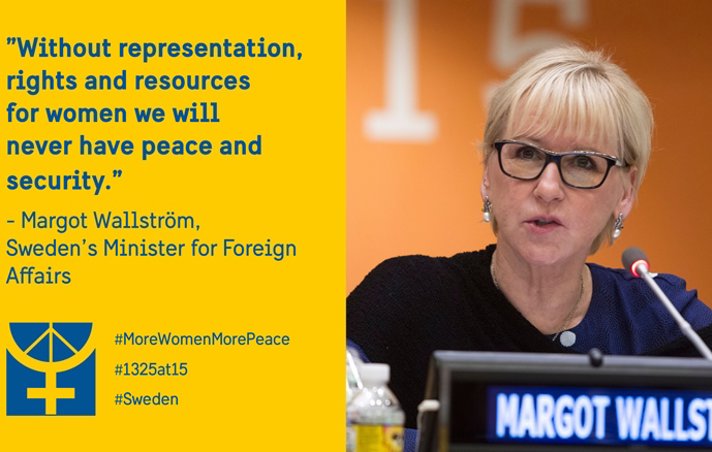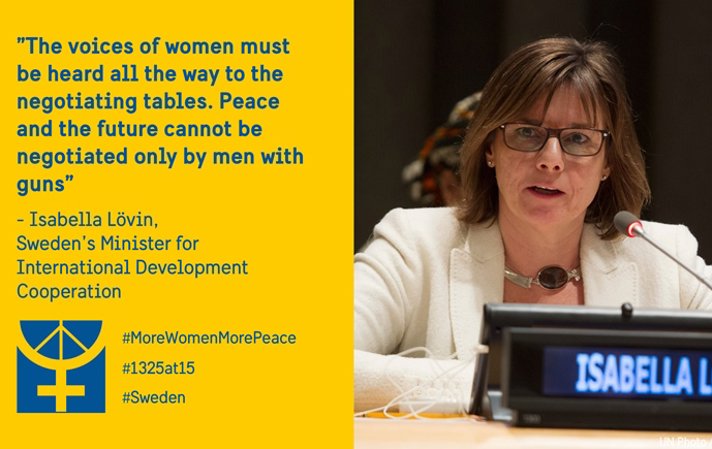Women’s participation helps ensure that peace is more sustainable
Published
Women’s participation helps ensure that peace agreements are concluded and that peace is more sustainable. Likewise, women’s participation helps make humanitarian operations more effective and hastens economic recovery. But far too often, women are still excluded, which poses a threat to peace and security and sustainable development in several parts of the world. Sweden is therefore working actively to promote the agenda for women, peace and security.
In 2000, following active lobbying from civil society and others, the United Nations Security Council adopted resolution 1325 on women, peace and security.
The Security Council noted that it was necessary for international peace and security to increase women’s participation and influence in conflict resolution, peacekeeping and peacebuilding, and to highlight, prevent and combat the negative impact of armed conflict on women.
Seven subsequent resolutions have since been adopted and the eight resolutions together constitute the international agenda for women, peace and security.
The most recent, resolution 2242 (2015), was adopted unanimously by the Security Council on 13 October this year. The resolution had 72 co-sponsors, including Sweden, which is the largest number ever for a resolution on this subject. The resolution aims to improve the implementation of resolution 1325 and subsequent resolutions.
The Global Study on the implementation of resolution 1325
The Global Study commissioned by the Secretary General of the United Nations on the implementation of UN Security Council resolution 1325 on women, peace and security was presented in New York in mid-October. The study shows that women’s participation helps ensure that peace agreements are concluded and that peace is more sustainable. Likewise, women’s participation helps make humanitarian operations more effective and hastens economic recovery.
The study shows that some progress has been made in the last 15 years, including an increase in the number of references to women and gender equality in peace agreements and improved normative frameworks on conflict-related sexual violence.
The study also provides a clear picture of the challenges that remain, and sets out several recommendations.
It emphasises:
- the need for adequate financing,
- the importance of strong national justice systems to prosecute perpetrators of sexual and gender-based violence,
- increased focus on transitional justice with a gender equality perspective,
- more resources for conflict prevention,
- ensuring that efforts to combat violent extremism have a gender perspective
The study's clearest recommendation and conclusion is that women’s participation is crucial to effective, successful and sustainable peace processes.
Sweden’s efforts on the agenda for women, peace and security
Working for the implementation of resolution 1325 and subsequent resolutions is part of our feminist foreign policy and a priority issue for Sweden. Resolution 1325 will be an integral and natural part of both day-to-day and long-term strategic work for peace and security. The increased participation of women and a gender equality perspective will be secured in the areas covered by the resolution. The implementation of resolution 1325 contributes to achieving aims within foreign, security, development and defence policy, and also gender equality policy.
Sweden has had a national action plan for the implementation of resolution 1325 in place since 2006 and works actively to ensure that a gender perspective is integrated in all international operations in conflict and post-conflict countries. Sweden’s third national action plan is currently being drawn up, following broad consultations with relevant actors in Sweden and five conflict and post-conflict countries: Afghanistan, Colombia, the Democratic Republic of the Congo, Liberia and Palestine. The new action plan will enter into force in 2016.
Increasing women’s participation in conflict prevention, peacekeeping and peacebuilding is a top priority for Sweden. As part of these efforts, Sweden has taken the initiative to start a network of women mediators, who in two years’ time will be ready to assist in peace negotiations. Alongside this, Sweden is helping to form a Nordic network of women mediators.
Sweden is also working actively to put 1325-related issues on the agenda in regional and multilateral organisations. During the year, Sweden has worked towards the establishment by the EU of a senior gender adviser position at the EEAS and is pleased that such a position was recently established. Sweden will continue to work to fully integrate a gender perspective in the EU’s civilian and military crisis management operations and to strengthen the EU’s gender expertise in institutions as well as on the ground. Sweden is also working towards strengthened gender skills at the UN and gender mainstreaming in all UN activities – at strategic, tactical and operational level.
All Swedish personnel who participate in international operations are given preparatory training including a 1325 and/or gender equality component. In addition, Sweden seconds three gender advisers per year on average to international civilian crisis management missions.
Sweden is engaged in extensive international development cooperation where gender equality and women’s rights and participation are clear priorities. In 2014, Sweden was the largest donor to UN Women, donating USD 35 million. Sweden is also among the largest donors to UN Action Against Sexual Violence in Conflict, and provides extensive support to women’s organisations working for peace in conflict-affected countries.



 X
X